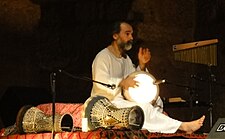Mısırlı Ahmet

Mısırlı Ahmet (Born Ahmet Yıldırım, 1967 in Ankara, Turkey) is a Turkish virtioso darbuka player. His music spans various genres and carries influences from Indian, Arabic, Latin American and jazz music.
Ahmet Yıldırım started his music life playing a Turkish-style darbuka. He states that he was a fairly ordinary player before his travel to Egypt, to play with and learn from some of the best darbuka players; most of all "to find the meaning of his existence" and "to discover the rhtym". Yıldırım lived in the desert-bound valley of Cairo, during which he developed his unique technique, now known as the split-finger technique, which allows for very quick playing.
Yıldırım came to be known as "Mısırlı Ahmet" (Ahmet of Egypt) after his journey. He is called "Ahmed-i Turkî" (Turkish Ahmet) in Egypt.
Solo Albums
- Great Masters of Mediterrenean / Natural Moments (2005)
- The Search (2001)
- Mel de Cabra (2000)
- Oriental Dance and Percussion (1993)
Quotes
- You have to lose the rythm first in order to discover it.
- I found myself in darbuka. I may be the best darbuka player, but it's not enough, I want to be darbuka!
- I became obsessed with Egyptian musicians, listening to their CDs, I thought "These guys are out of this world! What do I have to tell them?" I started with saying "There should be something you can tell", and created a new technique. This is a milestone in darbuka. I heard very interesting tones in the desert. You can hear your own heartbeat there. After the 90s, there was nothing more to inspire me on darbuka so I took up doholle (bass darbuka). I too am surprised with the sounds coming out of the doholle; I think "God, do I have enough time? Will I be able to wrap this up?". Life is too short, I don't have any time. My biggest ideal is to perform a great solo before I die, like "He played so great just two hours ago, and now he's dead. Here's the instrument, it's not even dried yet."
